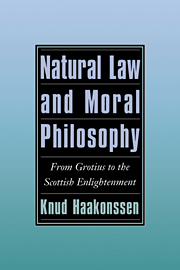Book contents
- Frontmatter
- Contents
- Acknowledgements
- Introduction: The Scottish Enlightenment in the history of ideas
- 1 Natural law in the seventeenth century
- 2 Natural law and moral realism: The civic humanist synthesis in Francis Hutcheson and George Turnbull
- 3 Between superstition and enthusiasm: David Hume's theory of justice, government, and politics
- 4 Adam Smith out of context: His theory of rights in Prussian perspective
- 5 John Millar and the science of a legislator
- 6 Thomas Reid's moral and political philosophy
- 7 Dugald Stewart and the science of a legislator
- 8 The science of a legislator in James Mackintosh's moral philosophy
- 9 James Mill and Scottish moral philosophy
- 10 From natural law to the rights of man: A European perspective on American debates
- Bibliography
- Index
10 - From natural law to the rights of man: A European perspective on American debates
Published online by Cambridge University Press: 05 June 2012
- Frontmatter
- Contents
- Acknowledgements
- Introduction: The Scottish Enlightenment in the history of ideas
- 1 Natural law in the seventeenth century
- 2 Natural law and moral realism: The civic humanist synthesis in Francis Hutcheson and George Turnbull
- 3 Between superstition and enthusiasm: David Hume's theory of justice, government, and politics
- 4 Adam Smith out of context: His theory of rights in Prussian perspective
- 5 John Millar and the science of a legislator
- 6 Thomas Reid's moral and political philosophy
- 7 Dugald Stewart and the science of a legislator
- 8 The science of a legislator in James Mackintosh's moral philosophy
- 9 James Mill and Scottish moral philosophy
- 10 From natural law to the rights of man: A European perspective on American debates
- Bibliography
- Index
Summary
English and American jurisprudence
As the first ten amendments were making their way through the provisions of the new Constitution they were to amend, American jurisprudence was being systematically formulated by the recently appointed Professor to the new Chair of Law at the College of Philadelphia. With much rhetorical force and eclectic learning, James Wilson presented a public course of lectures, one important aim of which was to give an American answer to the jurisprudence of Sir William Blackstone. In doing so, Wilson effectively provided one of the earliest sustained analyses of the contrast between the American cultivation of rights as the basis for social ethics and politico-legal institutions and the British reliance on a combination of common law and policy. Wilson would, in fact, have recognized all the leading themes in a recent analysis of this kind.
Nowhere is the theoretical scope of Wilson's polemics brought out more dramatically than in his discussion ‘of the natural rights of individuals’. Here Blackstone is joined by Edmund Burke's recent Reflections on the Revolution in France as the epitome of British thinking. Wilson understands the two British thinkers to be maintaining that all, or – allowing for Blackstone's lack of clarity in the matter – at least all significant, natural rights are given up in civil society in return for such fundamental legal rights as those contained in Magna Charta, that is, ‘civil privileges, provided by society, in lieu of the natural liberties given up by individuals’.
- Type
- Chapter
- Information
- Natural Law and Moral PhilosophyFrom Grotius to the Scottish Enlightenment, pp. 310 - 342Publisher: Cambridge University PressPrint publication year: 1996
- 1
- Cited by



